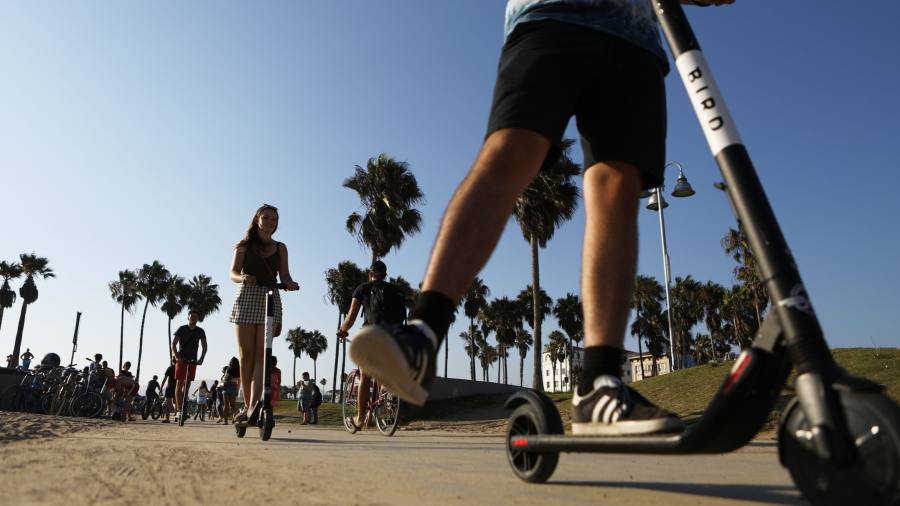
E-scooter rental pioneer Bird has warned it faces possible bankruptcy within the next 12 months unless it can raise more cash, in a sign of a dramatic change in fortunes for one of the hottest tech sectors of recent years.
Bird became the fastest start-up to reach a $1bn “unicorn” valuation in 2018, but is now fighting for survival after warning investors it had overstated its historical revenues by tens of millions of dollars.
On Monday evening, Bird said there was “substantial doubt about the company’s ability to continue as a going concern”, even after shuttering operations in dozens of cities, overhauling its management team and renegotiating its debt payments in an effort to slash costs.
“We have had to adapt quickly,” said Shane Torchiana, who replaced Bird founder Travis VanderZanden as chief executive in September. “We don’t believe that selling $2 for $1 is a viable business strategy.”
Venture capital investors have poured more than $4bn into lossmaking e-scooter rental companies over the past five years, according to investment tracker Dealroom.co, fuelled by low interest rates and a wave of hype that small electric vehicles would reshape urban transportation.
Miami-based Bird raised almost $1bn as it raced rivals such as Lime, Tier, Voi and Dott to expand around the world.
But the sector has been hit by investors’ waning appetite for lossmaking tech start-ups, leaving e-scooter operators starved of the capital they need for vehicles, just as the seasonal winter slowdown begins.
“Bird grew too quickly — it launched in too many cities before it had a viable model,” said one former employee. “It was losing money on every ride, so the more cities and more rides it was doing the more money it lost.”
After raising private capital from blue-chip Silicon Valley funds including Sequoia Capital, Index Ventures and Accel, Bird merged with blank-cheque company Switchback II in November last year at an initial valuation of $2.3bn. Its market capitalisation has since fallen more than 90 per cent to below $100mn, as investor fears grow for its future.
Although revenues grew 24 per cent in the first nine months of the year to $175mn, net losses almost doubled to $322.3mn. It generated $2.2mn in cash flow from operations in the latest quarter.
Shares in Bird fell 16 per cent on Monday and opened another 12 per cent lower on Tuesday to $0.32 in early New York trading. If Bird’s share price does not rise above $1 by the end of the year, it faces delisting from the New York Stock Exchange.
On Monday, Bird revealed that it had overstated its sales over the past two and a half years by an estimated $31.6mn, after discovering that scooter rides taken by customers without enough funds in their prepaid “wallets” to pay for them were being erroneously recognised as revenue.
Bird blamed a “material weakness in its internal control over financial reporting” and said it would reissue its past financial statements.
At the end of September, Bird said it had $38.5mn in unrestricted cash and cash equivalents “which, without additional funding, will not be sufficient to meet the company’s obligations within the next 12 months”.
“If the company is unable to raise additional capital or generate cash flows necessary to expand its operations and invest in continued innovation, it may not be able to compete successfully and may need to scale back or discontinue certain or all of its operations in order to reduce costs or seek bankruptcy protection,” Bird said.
In May, Bird struck an agreement with hedge fund Yorkville that could allow it to raise capital by selling up to 48.5mn shares, which has not yet been tapped, executives said. It is also exploring “various other capital fundraising opportunities”.